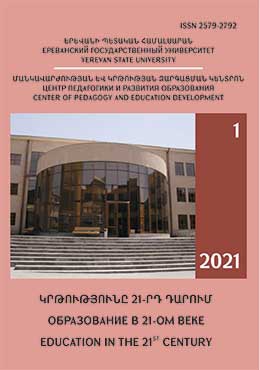INCLUSIVE EDUCATION IN AGRICULTURAL UNIVERSITIES: PROBLEMS AND PROSPECTS OF DEVELOPMENT
DOI:
https://doi.org/10.46991/educ-21st-century.v1i5.10755Keywords:
inclusive education, additional professional education, agricultural education, tasks of agricultural higher education, professional development.Abstract
The relevance of the research topic is due to the fact that modern Russian higher education solves the urgent tasks of standardization of educational and professional activities, digitalization of education, and among these tasks, the implementation of inclusive education is vital. As the analysis of scientific and pedagogical theory and practice has shown, in the implementation of inclusive education at a university, ideas of axiological and acmeological approaches, principles of social integration, requirements for rehabilitation, habilitation, accessibility and psychological and pedagogical support of students, technologization of integrated education are in demand. Meanwhile, a contradiction was revealed between a sufficient study of the process of inclusive development of universities subordinate to the Ministry of Education of the Russian Federation and an insufficient psychological and pedagogical study of the features of inclusive education in departmental universities, including the Ministry of Agriculture of the Russian Federation. We have analyzed the process of implementing inclusive education at the State University of Land Use Planning and a number of other agricultural universities, which made it possible to draw conclusions and generalizations. The problems of inclusion in agricultural universities are multifaceted and ambiguous, they require the consolidation of the efforts of all departments of the university, administration, scientific and pedagogical and teaching staff, and other specialists. The urgent task is to design network educational programs; interaction of agricultural universities in the implementation of inclusion through the RUMC, advanced training of scientific and pedagogical workers in the field of inclusive education. No less important is vocational
248
guidance work, which should be carried out systematically, in a planned way, primarily in those schools and secondary professional organizations where inclusive education is implemented. It is obvious that ensuring the conditions for admission to the university for disabled people and people with disabilities is a priority task in attracting such applicants. The study found that inclusive agrarian education develops in the direction of improving the material and technical and educational and methodological base of the educational process of persons with special needs; creating an accessible environment; inclusion of students with special needs in the socio-cultural space of the university.
References
Горюнова Л. В., Особенности магистерской подготовки педагогических кадров к организа-ции в системе инклюзивного образования социокультурной анимации, реабилитации, абилитации обучающихся с инвалидностью // Гуманитарные науки. 2017. № 2 (38). С. 169–174. URL: https://clck.ru/ F3w88 (дата обращения: 17.03.2018).
Дамадаева А. С., Бехоева А. А., Проблемы и возможности реализации инклюзивного образо-вания в современном вузе // Национальный психологический журнал. – 2019. – № 3(35). – С. 125–133 URL: http://psycdigest.ru/articles/detail.php?article=8193
Модельный образец специальных образовательных условий для получения высшего образования студентами с инвалидностью: опыт создания и применения / В. В. Рубцов [и др.] // Психологическая наука и образование. 2017. Т. 22, № 1. С. 34–49. DOI: 10.17759/pse.2017220106
Новый аспект личностно-ориентированного подхода к отбору содержания профессионально-педагогической подготовки тифлопедагогов (на жизненном примере В.З. Денискиной/ Сафонова Т.В., Широкорад И.И. Проблемы специального образования. Научно-методический журнал Армянского педагогического университета им. Хачатура Абовяна. – Ереван, 2017. 2017. № 5. С. 172-178.
Ряписова А. Г., Инклюзивное образование как системная инновация // Вестник Новоси-бирского государственного университета. 2017. Т. 7, № 1. С. 7–20. DOI: 10.15293/2226-3365.1701.01
Хуснутдинова М. Р., Риски инклюзивного образования // Образование и наука. 2017. Т. 19, № 3. С. 26–46. DOI: 10.17853/1994-5639-2017-3-26-46.
Personality Traits of Expert Teachers of Students with Ebd: Clarifying a Teacher’s X-Factor / B. Svenja [et al.] // International Journal of Inclusive Education. 2016. Vol. 20, Issue 6. Pp. 569–587. DOI: 10.1080/13603116.2015.1100222
Timo S., How Common are Inclusive Educational Practices Among Finnish Teachers? // International Journal of Inclusive Education. 2018. Vol. 22, Issue 5. Pp. 560–575. DOI: 10.1080/13603116.2017.1390001
Sagner-Tapia J., An Analysis of Alterity in Teachers’ Inclusive Pedagogical Practices // International Journal of Inclusive Education. 2017. Vol. 22, Issue 4. Pp. 375–390. DOI: 10.1080/13603116.2017.1370735
Sсhlessinger S., Reclaiming Teacher Intellectualism Through and for Inclusive Education // International Journal of Inclusive Education. 2018. Vol. 22, Issue 3. Pp. 268–284. DOI: 10.1080/13603116.2017.1362598
Downloads
Published
How to Cite
Issue
Section
License

This work is licensed under a Creative Commons Attribution-NonCommercial 4.0 International License.

